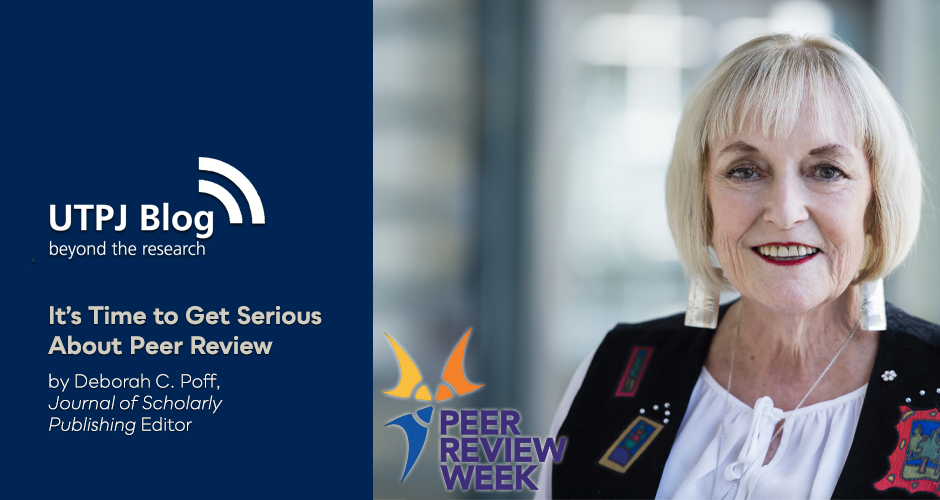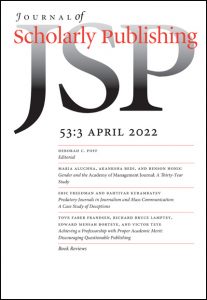
Written by guest blogger Deborah C. Poff, CM, PhD, Editor of the Journal of Scholarly Publishing.
Peer Review Week which is now entering its 8th year chose as its timely theme this year – Research Integrity: Creating and Supporting Trust in Research. As the Editor of the Journal of Scholarly Publishing (JSP) and a long-time editor of journals, books, an encyclopedia and various proceedings and anthologies, I can tell you that key and critically important to research integrity and publication ethics is peer review.
 Peer review has changed considerably over the last few years and ranges from the traditional anonymous peer review practised by JSP to open integrative, iterative types of peer review where authors and reviewers both know each other’s identities. What is common among different types of peer review is, at its best, the constructive, informed expertise and feedback provided to authors by specialists on the substance and structure of their articles. I say “at its best” because generally peer review is a laissez-faire kind of engagement. General characteristics of peer review are as follows:
Peer review has changed considerably over the last few years and ranges from the traditional anonymous peer review practised by JSP to open integrative, iterative types of peer review where authors and reviewers both know each other’s identities. What is common among different types of peer review is, at its best, the constructive, informed expertise and feedback provided to authors by specialists on the substance and structure of their articles. I say “at its best” because generally peer review is a laissez-faire kind of engagement. General characteristics of peer review are as follows:
- Volunteer labour without financial compensation and sometimes without recognition by the journal;
- Frequently untrained labour in nature as most journals do not provide formal guidance and education as to how to write a good peer review report;
- Under-appreciated labour by universities, generally treated as unquantified and non-specific “service to the profession” and with little impact on tenure and promotion.
Yet, peer review is the key mechanism for the evaluation of federal research grants and other granting agencies; of input for editors for the publication of articles, books as well as policies and scholarly guidelines for governments and scholarly associations.
Given all of this, it is hardly surprising that most editors note that attracting peer reviewers is more challenging than it used to be. It is also perhaps understandable that some senior scholars advise junior scholars not to “waste” their time doing peer review.
Peer review is the mechanism for the constructive criticism intended to improve and correct the scholarly product. The scholarly product is the dissemination mechanism for scholarly research and the acquisition of new knowledge. It is critically important to research integrity and to the progression of knowledge. Among other things, the product becomes the material for teaching each generation of university students.
Given the critical nature and relationship of peer review to research integrity, it is vital that editors, publishers and universities work together to:
- Provide substantive recognition for the labour done by peer reviewers – most concretely and importantly in standardizing recognition of peer review for tenure and promotion;
- That editors and publishers standardize criteria and guidelines for the production of quality peer review and to advise peer reviewers on the nature of the requirements necessary to provide competent peer reviews;
- That editors and publishers provide standardized feedback to universities for the recognition of this important labour.
These mechanisms should provide standardized quality peer reviews and standardized employment recognition for the work. The importance of implementing these proposals should be transparent and self-evident and is long over-due.
About the Author
 Deborah Poff is a retired Professor of Philosophy and Senior Academic Administrator. During Deborah’s career, she was variously the Director of a Research Institute; a Dean of Arts and Science; a Vice-President Academic and Provost and a President and Vice-Chancellor at various Canadian Universities.
Deborah Poff is a retired Professor of Philosophy and Senior Academic Administrator. During Deborah’s career, she was variously the Director of a Research Institute; a Dean of Arts and Science; a Vice-President Academic and Provost and a President and Vice-Chancellor at various Canadian Universities.
She is currently the Editor of the Journal of Scholarly Publishing, published by University of Toronto Press. Throughout her career, she has been the editor of five scholarly journals, a book series and has published numerous other monographs and anthologies.
Deborah has served nine years on the Committee on Publication Ethics Council and Board of Trustees, including in the role of Chair and is a recognized leader in the field of publication ethics.
In 2016, Deborah Poff was awarded the Order of Canada through the Office of the Governor General of Canada.
Comments on this entry are closed.